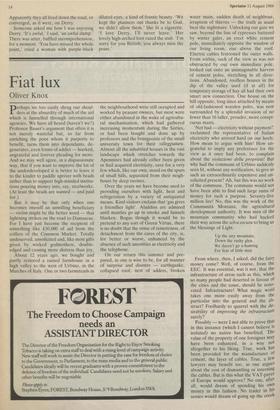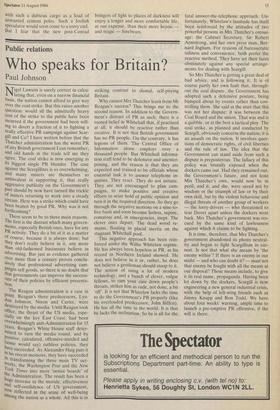Fiat lux
Oliver Knox
perhaps we too easily shrug our shoul- ders at the absurdity of much of the aid which is funnelled through international agencies. We have all heard (haven't we?) Professor Bauer's argument that often it is not merely wasteful but, so far from enriching the poor whom it purports to benefit, turns them into dependants, de- generates, even forms of addict — hooked, ungrateful and forever pleading for more. And we may well agree, in a dispassionate way, that if you want to improve the lot of the underdeveloped it is better to leave it to the kinder to paddle upriver with beads rather than to support high-minded institu- tions pouring money into, say, steelworks. (At least the beads are wanted — and paid for.)
But it may be that only when one becomes oneself an unwilling beneficiary — victim might be the better word — that lightning strikes on the road to Damascus. For I have just become the recipient of something like £30,000 of aid from the coffers of the Common Market. Totally undeserved, unsolicited and, like most gifts given by wicked godmothers, double- edged and causing more distress than joy.
About 12 years ago, we bought and partly restored a ruined farmhouse in a high valley to the west of Urbino, in the Marches of Italy. One or two farmsteads in
the neighbourhood were still occupied and worked by peasant owners, but most were either abandoned in the wake of agricultu- ral mechanisation, which had gathered increasing momentum during the Sixties, or had been bought and done up by professors and the bourgeoisie of the small university town for their villeggiatura. Almost all the inhabited houses in the vast landscape which stretches towards the Apennines had already either been given or had acquired electricity, save for a very few which, like our own, stood on the spurs of small hills, separated from their neigh- bours by deep ravines.
Over the years we have become used to providing ourselves with light, heat and refrigeration by a variety of antiquated means. Kind visitors exclaim that 'gas gives a friendlier light'. Aladdins are admired until mantles go up in smoke and funnels blacken. Bogus though it would be to pretend to any sort of Green Virtue, there is no doubt that the sense of remoteness, of detachment from the cares of the city, is, for better or worse, enhanced by the absence of such amenities as electricity and the telephone.
On our return this summer and pre- pared, as one is wise to be, for all manner of surprise and disaster — earthquake, collapsed roof, nest of adders, broken water main, sudden death of neighbour, irruption of thieves — the truth as usual beat the nightmare. Unlocking our gate we saw, beyond the line of cypresses battered by winter gales, an erect white cement pole, immediately opposite the window of our living room, rise above the roof. Electric cables festooned the outer walls. From within, such of the view as was not obstructed by our own immediate pole, looked out onto an unimaginable harvest of cement poles, stretching in all direc- tions. Abandoned, roofless houses in the dip of the valley used (if at all) for temporary storage of hay all had their own smart new connection. One house on the hill opposite, long since attached by means of old-fashioned wooden poles, was now surrounded by a splendid invasion of no fewer than 16 taller, prouder, more conspi- cuous masts.
'Not bad — electricity without payment!' exclaimed the representative of Italian electricity who arrived hard on our heels. How mean to argue with him! How un- grateful to imply any preference for the view as it once had been, to complain about the violazione della proprietci! But why had the commune of Urbino suddenly seen fit, without any notification, to give us such an extraordinarily expensive and un- solicited present? Ah, but this was no work of the commune. The commune would not have been able to find such large sums of money for such a purpose. Seventy-five million lire! No, this was the work of the Community Montana, the agricultural development authority. It was men of the mountain community who had hacked their way across the selva oscura to bring us the blessings of Light.
Up the airy mountain, Down the rushy glen, We daren't go a-hunting For fear of little men.
From where, then, I asked, did the fairy money come? Well, of course, from the EEC. It was essential, was it not, that the infrastructure of areas such as this, which so many people had deserted in favour of the cities and the coast, should be reno- vated. Infrastructure! What magic word takes one more easily away from the particular into the general and the ab- stract? Foolhardy to quarrel with the de- sirability of improving the infrastructure surely?
Possibly — were I not able to prove that in this instance (which I cannot believe Is isolated) no native has benefited. The value of the property of one foreigner may have been enhanced, in a way not altogether to his liking. True, work has been provided for the manufacturer of cement, the layer of cables. True, a few lawyers may benefit too, as one argues about the cost of dismantling or interning the cables. But is this what the VAT-payer of Europe would approve? No one, after all, would dream of spending his own money in this fashion. No trader in his senses would dream of going up the creek with such a dubious cargo as a load of unwanted cement poles. Such a foolish speculator would soon come to a sorry end. But I fear that the new post-Conrad bringers of light to places of darkness will enjoy a longer and more comfortable life, at our expense, than their more heroic and tragic — forebears.







































 Previous page
Previous page